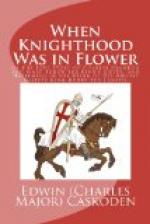“Is the stranger one whom you would not want?” asked Mary, with a dimpling smile and a flash of her brown eyes.
“He most certainly is,” returned the king.
“Then I will fall in love with him at once. In fact, I don’t know but I have already.”
“Oh, I have no doubt of that; if I wanted him, he might be Apollo himself and you would have none of him.” King Henry had been compelled to refuse several very advantageous alliances because this fair, coaxing, self-willed sister would not consent to be a part of the moving consideration.
“But can you not tell me who he is, and what his degree?” went on Mary in a bantering tone.
“He has no degree; he is a plain, untitled soldier, not even a knight; that is, not an English knight. I think he has a German or Spanish order of some sort.”
“Not a duke; not an earl; not even a baron or knight? Now he has become interesting.”
“Yes, I suppose so; but don’t bother me.”
“Will he be at the dance and banquet to-night?”
“No! No! Now I must go; don’t bother me, I say.” And the king moved away.
That night we had a grand banquet and dance at Westminster, and the next day we all, excepting Lady Mary, went back to Greenwich by boat, paying a farthing a head for our fare. This was just after the law fixing the boat fare, and the watermen were a quarreling lot, you may be sure. One farthing from Westminster to Greenwich! Eight miles. No wonder they were angry.
The next day I went back to London on an errand, and over to Wolsey’s house to borrow a book. While there Master Cavendish, Wolsey’s secretary, presented me to the handsome stranger, and he proved to be no other than Charles Brandon, who had fought the terrible duel down in Suffolk. I could hardly believe that so mild-mannered and boyish a person could have taken the leading part in such a tragedy. But with all his gentleness there was an underlying dash of cool daring which intimated plainly enough that he was not all mildness.
We became friends at once, drawn together by that subtle human quality which makes one nature fit into another, resulting in friendship between men, and love between men and women. We soon found that we had many tastes in common, chief among which was the strongest of all congenial bonds, the love of books. In fact we had come to know each other through our common love of reading, for he also had gone to Master Cavendish, who had a fine library, to borrow some volumes to take with him down to Greenwich.
Brandon informed me he was to go to Greenwich that day, so we determined to see a little of London, which was new to him, and then take boat in time to be at the palace before dark.
That evening, upon arriving at Greenwich, we hunted up Brandon’s uncle, the Master of Horse, who invited his nephew to stay with him for the night. He refused, however, and accepted an invitation to take a bed in my room.




